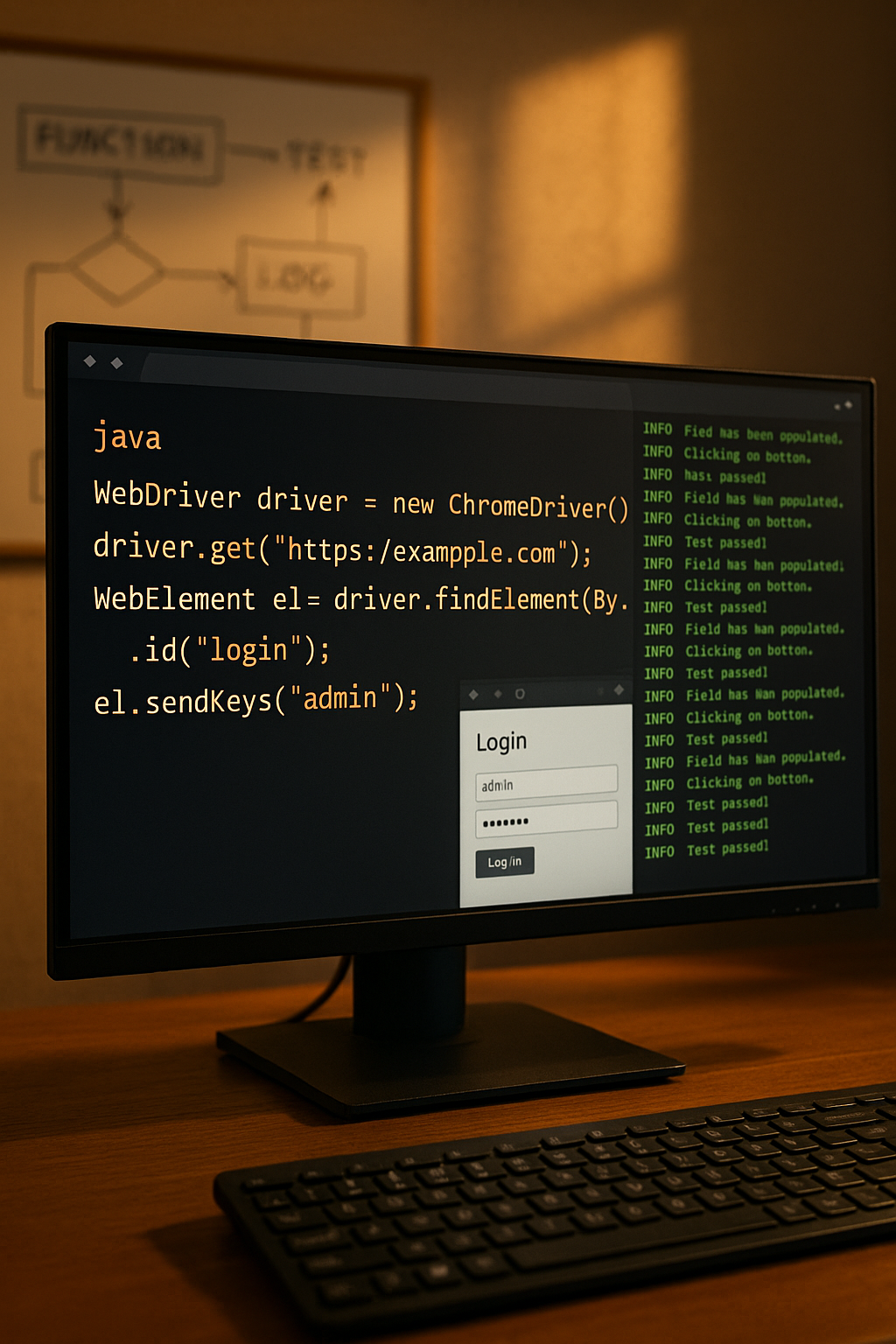Lines of Code, Echoes of Life: The Quiet Soul of Automation
An Image That Speaks Beyond Sight
Bathed in the warm amber glow of a desk lamp, a single screen glows with quiet intensity. The Java code it displays—precise, methodical—acts not only as instruction to a machine, but as an unspoken dialogue between human intention and synthetic obedience. The login form waits with frozen patience. The keystrokes typed by a script echo a ritual once performed by fingers and will.
There’s a haunting elegance to it: `driver.get(“https://exampmle.com”);`. A slight misspelling—a human flaw—punctuates the automation’s sterile accuracy. Yet this image reminds us that behind each line of code is a memory, a decision, a hand that once crafted with purpose. Even as the test passes, what remains isn’t just a checkmark. It’s the echo of human presence coded into digital breath.
The Heart’s Memory of Feeling
Automation often speaks in whispers. In that silent hum of the monitor, in the orderly green logs of “INFO Test passed!”—there lies a longing for control, for certainty in a world otherwise full of unpredictability. We code not only to instruct, but to preserve—like glass jars capturing lightning bugs of knowledge and routine.
This image holds space for all the nights someone sat alone, building a system that could remember for them. Login credentials, testing paths, button clicks—these aren’t just sequences; they’re digital metaphors for the moments we want to perfect, to repeat, to protect. Each test that passes is a silent affirmation that some part of life, at least, is still in order.
Between Stillness and Becoming
The screen shows no human face, but it radiates presence. A presence becoming. In the stillness of this setup—screen, code, keyboard—lives a dynamic act of becoming, where logic meets longing. Between the `findElement()` and the `sendKeys()`, we see more than just a function. We see a heartbeat translated into syntax. A will, subdued into silence, but still pulsing through the lines.
And what is automation if not a mirror of our deepest desires? The desire to simplify, to hold on, to ensure that even when we sleep, something we made stays awake—clicking buttons, filling fields, validating our paths. There’s beauty in this cold precision, but there’s also ache. A quiet yearning that the machine might understand not just what we do, but why we do it.
Wounds, Wisdom & Gentle Healing
In this era of hyper-efficiency, we often forget that automation arises from vulnerability. From mistakes made one too many times. From burnout, from missed deadlines, from forgetfulness. This code, this automation—it’s not just convenience. It’s healing. It’s a balm for the weary, the overworked, the emotionally stretched.
We write scripts not just to test websites, but to protect our energy. To delegate tasks that once drained us. In doing so, we free parts of ourselves for presence, for creativity, for breath. This monitor, glowing in isolation, becomes a shrine to that quiet act of self-rescue. As Healthline on Art Therapy reminds us, creation—of art or automation—is a way to process pain and reframe purpose.
The Shared Breath of Culture
Across the globe, thousands of developers and dreamers look at similar screens, write similar lines. They click, compile, debug—each one contributing to an invisible web of collective will. Behind each browser automation is not just functionality—it’s culture. It’s a reflection of our shared values: consistency, clarity, progress.
We are building something beyond tools. We are encoding our lives, our languages, our legacies. What we automate reflects what we prioritize. And what we prioritize shapes the future. This simple login test, looping silently, becomes a metaphor for every act of preparation, of preservation, of purpose passed forward.
Inspired by this reflection? Find more moments of meaning through our curated collections:


